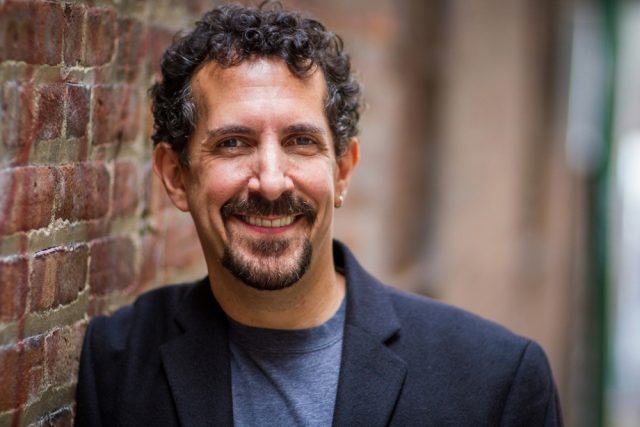
NY Classical moves from the parks to Zoom for live, rehearsed benefit reading of King Lear on June 25
KING LEAR
NY Classical
Thursday, June 25, free with advance RSVP (suggested donation $30 per person), 8:00
nyclassical.org/king-lear
One of the hallmarks of summer in New York City is the plethora of free outdoor theater, from the Public’s star-studded Shakespeare in the Park at the Delacorte to such troupes as Smith Street Stage, Hudson Warehouse, Moose Hall Theatre Company, Hip to Hip, the Classical Theatre of Harlem, Manhattan Shakespeare Project, Seven Stages Shakespeare Company, Gorilla Rep, the Boomerang Theatre Company, Molière in the Park, Piper Theatre Productions, the Drilling Company, and more putting on shows in such locales as Morningside Park, Carroll Park, Riverside Park, Inwood Hill Park, Gantry State Plaza Park, Marcus Garvey Park, Bryant Park, Socrates Sculpture Park, the Old Stone House, and even in a Lower East Side parking lot. Since 2000, NY Classical, under the leadership of founding artistic director Stephen Burdman, has presented more than seven hundred site-specific immersive performances of works by the Bard as well as Chekhov’s The Seagull, Molière’s The School for Husbands, Schiller’s Mary Stuart, and Shaw’s Misalliance, among others, in Central Park, Prospect Park, Rockefeller Park, Battery Park, Carl Schurz Park, Teardrop Park, and at the World Financial Center.
All productions have been shut down this summer because of the coronavirus crisis; parks are open, but crowds are limited to just ten in phase two and only twenty-five when we reach phase three. A California native who lives in New York City with his wife and son, Burdman had been preparing a dual look at King Lear this season, staging on alternate nights Shakespeare’s original, familiar version, which he might have written while in lockdown during a plague, and Nahum Tate’s 1681 “happy ending” adaptation, which was popular for about 150 years and is now seldom performed. On June 25 at 8:00, NY Classical will go virtual with a live, rehearsed Zoom reading incorporating both iterations, a streamlined two-hour show featuring Connie Castanzo, Vivia Font, Josh Jeffers, John Michalski, Jamila Sabares-Klemm, Nick Salamone, and Luke Zimmerman from wherever they are sheltering in place. Directed and adapted by Burdman, the reading is a benefit fundraiser for the company; admission is free, but if you can, you’re asked to make a suggested donation of thirty dollars per person. The money will help fund the full, alternating productions of King Lear planned for the fall. Burdman took a break from online rehearsals to discuss King Lear, Panoramic Theatre, and being a husband and father during a pandemic.
twi-ny: You’ve been sheltering in place with your wife and son. How has that been?
stephen burdman: It’s actually been easier than I expected. The three of us make a pretty good team — and we really travel well together. Fortunately, my wife’s work (which is mostly on conference calls around the world) didn’t change that much and our son adapted to Zoom learning really quickly. His school, the Abraham Joshua Heschel School, did an outstanding job of adapting to this extremely challenging environment while providing great support to the students.
One thing to note is that our managing director, Hillary Cohen, lost both of her parents to Covid-19 in early April. This has been extremely difficult and as a company we have been in mourning. We have decided to close our administrative office on August 10, which would have been her parents’ fifty-first wedding anniversary, as a day of mourning for them and the thousands of other lives lost to Covid-19.

Stephen Burdman founded NY Classical in 2000, directing many of its productions in parks all around the city
twi-ny: That’s both sad and deeply affecting. When did you decide to do a Zoom benefit reading, and why did you choose King Lear?
sb: King Lear, with alternating endings (both Shakespeare’s and Tate’s), was always our plan for our 2020 summer season. This is the culmination of a three-year project of investigating how Shakespeare’s company toured their shows outside London. In the time of plague, theaters were closed in Elizabethan London, and while we never expected to have a pandemic of our own. . . . We also had great success with both our six-actor Romeo and Juliet as well as the alternating versions of The Importance of Being Earnest, so this project was a combination of these recent experiments.
We auditioned and hired the actors and staff prior to New York State on Pause, and we wanted to make sure to keep our commitments to these wonderful people. In addition to a union salary, they are receiving pension and healthcare. This is an opportunity for us to develop the production with these artists and serve our audience community in the safest way possible.
twi-ny: How have you been able to maintain that?
sb: The core of our mission is that all our programs are free and open to the public. We never want ticket price to be a barrier to accessing our performances, so we have always depended on financially secure audience members paying for their experience and their less fortunate neighbors’ families. In that sense, we are able to maintain because we have a community-oriented “business model.” We play for everybody across the city’s economic spectrum, and those who can support us do.
twi-ny: I’m used to walking through Central Park and suddenly coming upon NY Classical rehearsing out in the open. What was the rehearsal process like for this reading? Have you been watching other livestreamed shows during the pandemic lockdown, either for pure entertainment or research?
sb: Zoom rehearsal has been really interesting. The Zoom format has its strengths and challenges. While I did watch a few other readings and did some best-practice research, I wanted to make sure that we approach this work in line with our signature technique — which is called Panoramic Theatre. We feel it is important that when our audience sees a Zoom reading and then a full production of the same script, there is no disconnect between the two. One should be a natural extension of the other.
Some elements of Panoramic Theatre staging immediately transfer. Our blocking style ensures that, when a character is speaking, they are facing toward the audience. In the parks, this helps the actors’ voices comfortably and sustainably reach as large an area as possible. On Zoom, they are also facing toward the audience, in order to better connect on an emotional level.
twi-ny: What are your thoughts about what theater will be like in New York City on the other side of this? Has the pandemic changed any of your views about how theater is made and/or performed for audiences?
sb: Honestly, I don’t think professional theater will be able to return to prepandemic levels for two to three years. I have many family and friends who live outside New York and they are feeling very wary of visiting the city right now. As I recently said to a major supporter of the company, “When are you going to feel comfortable sitting in a small, dark space with lots of people again?” Theaters that work outdoors, like NY Classical, will most likely produce sooner than most and we are still hoping to produce King Lear as a full production later this year. However, outdoor theaters that rely on bleacher-style seating will have to substantially reduce their attendance expectations.
twi-ny: You’ve been vocal on social media about the Black Lives Matter movement. What are some of the things that NY Classical is doing to address systemic racism?
sb: One of the founding artists and board members of NY Classical — and my best friend — was Black. Don Mayo was a consummate and extremely versatile actor who appeared in everything from August Wilson to Shakespeare, Broadway to regional theater, and was very committed to NY Classical. When he died nearly twelve years ago, we created the Don Mayo Fund for Classical Actors of Color. Since NY Classical started, we have employed many BIPOC artists as significant collaborators on our productions, but we recognize we need to do more.
NY Classical’s staff completed an intensive Diversity, Equity, and Inclusion training program. It really helped us more deeply understand how our non-Black company members have benefited from systemic racism. Now we are actively implementing changes and reimagining our company culture to fully reflect our anti-racist values. It means considering our unconscious biases, checking our areas of privilege, and consistently partnering as equals with more historically underrepresented teammates — casts, directors, designers and technicians, administrators, and board leadership — in producing classical theater.
twi-ny: When you’re not creating or watching theater, what are you doing with your time during these crises? What are some of your other obsessions?
sb: So, in addition to a deep reworking of King Lear, I have spent lots of time with my wife and son, doing projects around the house, reading (I am an avid reader and just finished War and Peace — my final book in a years-long project to read every major Russian classic), and watching a few television series. Right now, my son and I are (re)watching the entire Star Trek (TNG) series.
twi-ny: We recently finished the new Star Trek shows, Discovery and Picard. It looks like your family had a fun virtual Seder. It now seems like Jews will not be able to celebrate Rosh Hashanah and Yom Kippur in schul. Hopefully we’ll be back in temple by the time of your son’s Bar Mitzvah next spring. How has your family been dealing with that?
sb: Thanks! We had a blast! It was super nice to have family and friends from Los Angeles (my hometown) join us for Seder. As for the High Holidays, I’ve honestly been in a bit of denial. After this reading of King Lear is over, we will begin to consider some options. As for my son, who recently turned twelve and attends a Jewish school, a number of his classmates have postponed their b’nei mitzvahs into 2021. Right now, my wife is teaching him to chant his Torah portion and Haftorah. His grandmother (Bubbie, my wife’s mother) is a Jewish educator and spends time with him every week to study his portion and, ultimately, help craft his Bar Mitzvah speech. We’re very lucky this way, as his uncle (who co-officiated with my late father-in-law at our wedding) will also officiate at his service next spring.